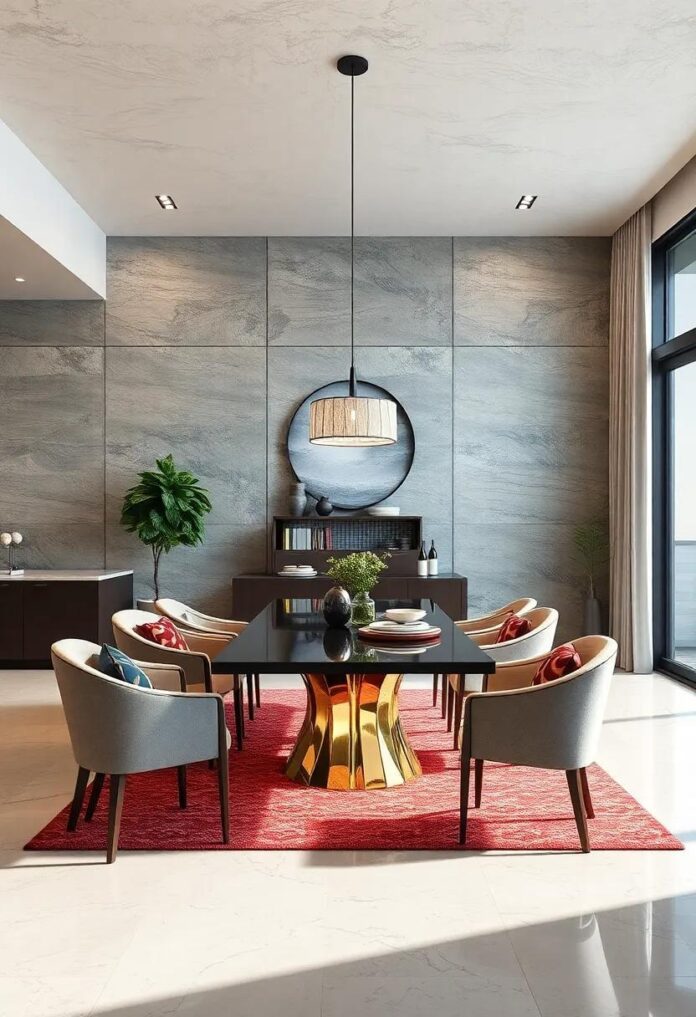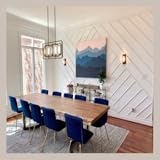In teh heart of the home, the dining room serves as more than just a space for mealtimes; it is a canvas for personal expression and a backdrop for cherished memories. As contemporary design continues to evolve, so to does the way we curate our dining environments, merging functionality with aesthetic allure. In this exploration of modern dining room styles, we’ll delve into an array of inspirations—from minimalist elegance to vibrant eclecticism—each offering a unique blend of practicality and charm. By examining key elements such as furniture choices, color palettes, and innovative layouts, we aim to guide you in creating a dining sanctuary that not only invites gathering but also reflects your individual taste. Join us as we uncover the trends and ideas that are shaping the contemporary dining experience, where every detail matters in crafting a space that feels both pleasant and stylish.
Embracing minimalism: The Art of Simple Yet Elegant Dining Room Designs
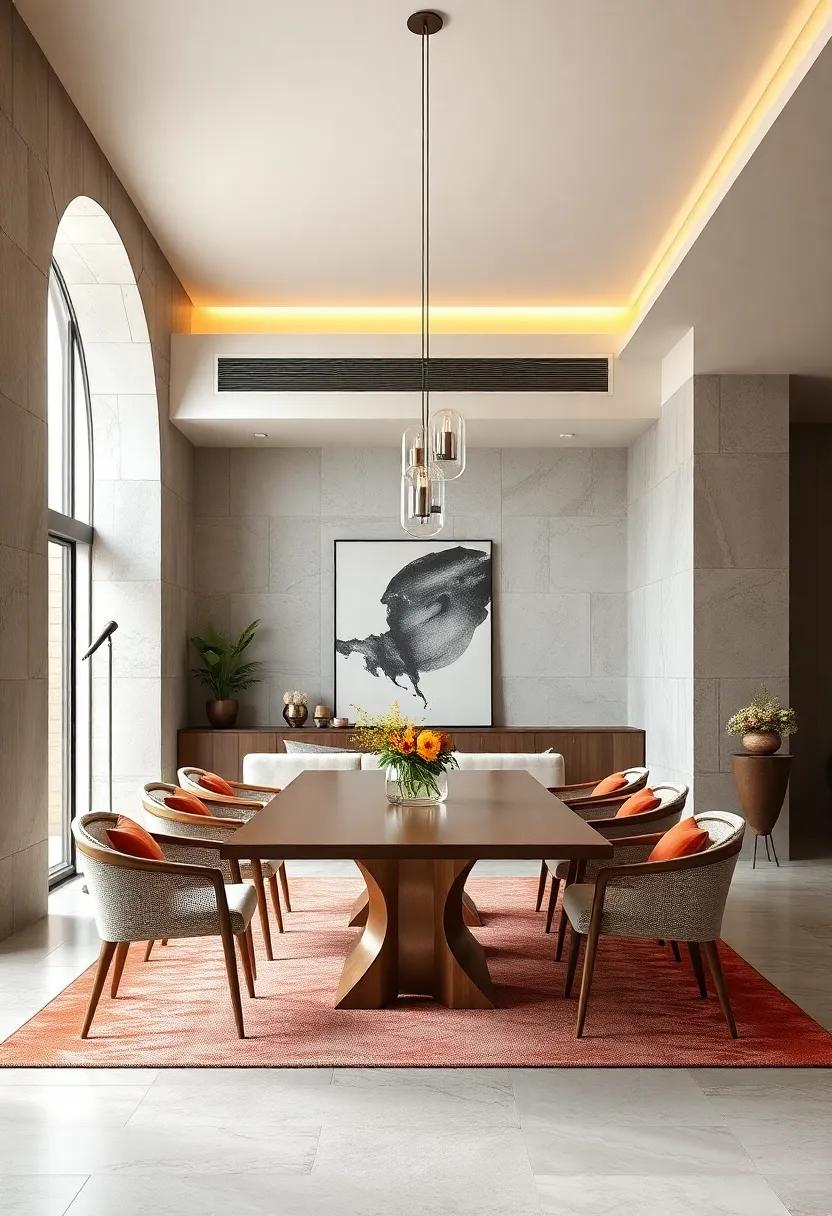
In a world brimming with excess,embracing a minimalist approach to dining room design invites tranquility and sophistication into the home. The beauty of simplicity lies in its ability to highlight the essentials while eliminating distractions. A few well-chosen elements can elevate the space, creating a cozy yet refined atmosphere.Consider incorporating:
- Natural materials: Use wood or stone to ground the design with warmth.
- Neutral color palettes: Soft whites,grays,and muted tones foster serenity.
- Functional furniture: Opt for tables and chairs that blend comfort with usability.
- Artistic accents: Add minimalistic decor pieces that serve both beauty and purpose.
In this elegant simplicity, every piece tells a story, reflecting a conscious design choice that resonates with modern living. Focus on creating a space where functionality and style coexist effortlessly. The arrangement of the dining area should invite gatherings, with an emphasis on intimacy and connection. Explore these elements for your dining room:
| Element | description |
|---|---|
| Lighting | Choose soft, diffused lights to create an inviting ambiance. |
| Tableware | Invest in quality, minimalist dishware that enhances the meal experience. |
| Greenery | add subtle plant life to bring a touch of nature indoors. |
Blending Vintage and Modern: A Timeless Approach to Contemporary Dining Spaces
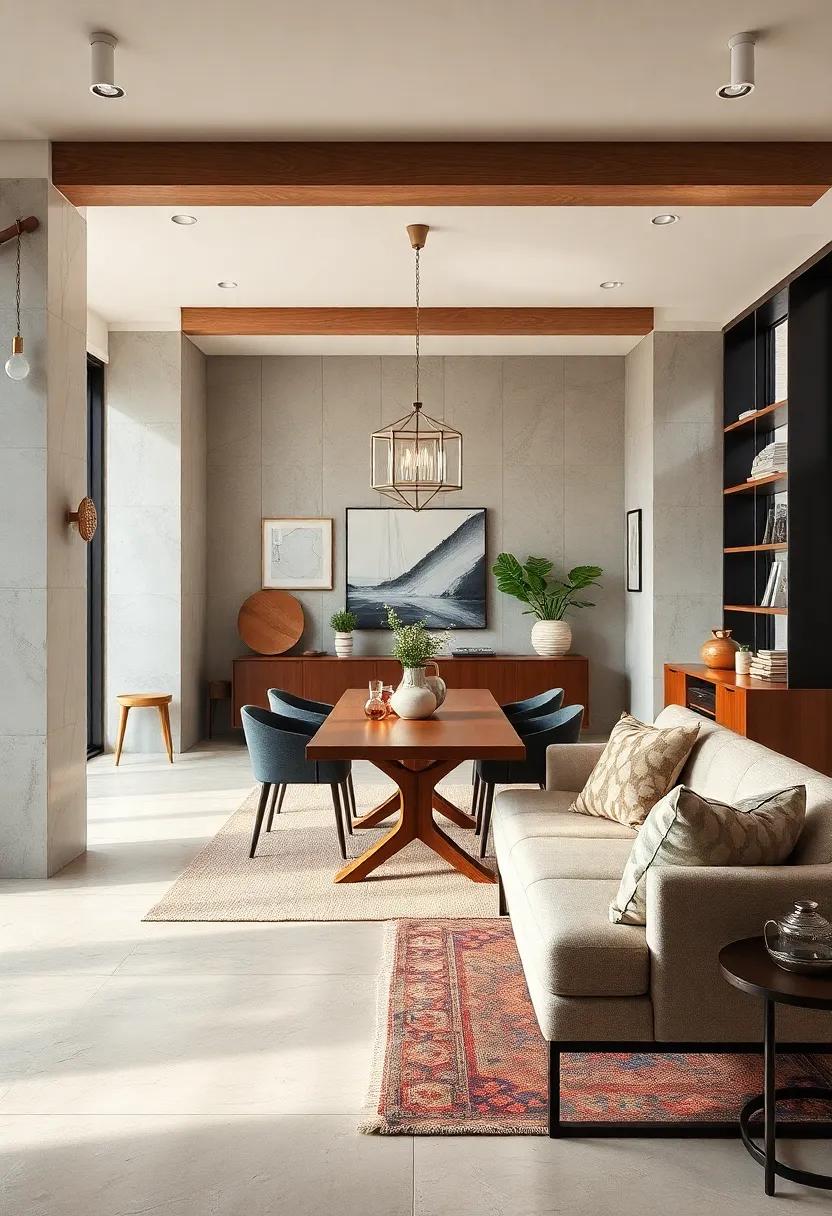
Creating a dinning space that successfully merges vintage charm with modern sensibilities can elevate your home to new heights of sophistication. Key elements of this design philosophy often include:
- Antique Furniture: Incorporating iconic pieces such as a Victorian dining table or a retro sideboard can provide character and warmth.
- Modern Accents: Pairing these antique items with sleek, contemporary chairs or minimalist lighting helps create a balance.
- Textural Variety: Mixing materials like reclaimed wood with polished metals or glass can create visual interest.
another powerful tactic is the use of color and patterns to tie the old and new together. Consider adding vintage-inspired wallpaper or a bold, contemporary rug to ground the space. A strategically placed statement piece, such as a vintage mirror or a modern art print, can serve as a focal point that enhances the overall aesthetic.
| Element | Vintage Influence | Modern Influence |
|---|---|---|
| Furniture | Antique Tables | Sleek Chairs |
| Lighting | Chandeliers | Pendant lights |
| Decor | Vintage Plates | Contemporary Art |
Maximizing Space: Creating Open-Concept Dining Areas for Modern Living
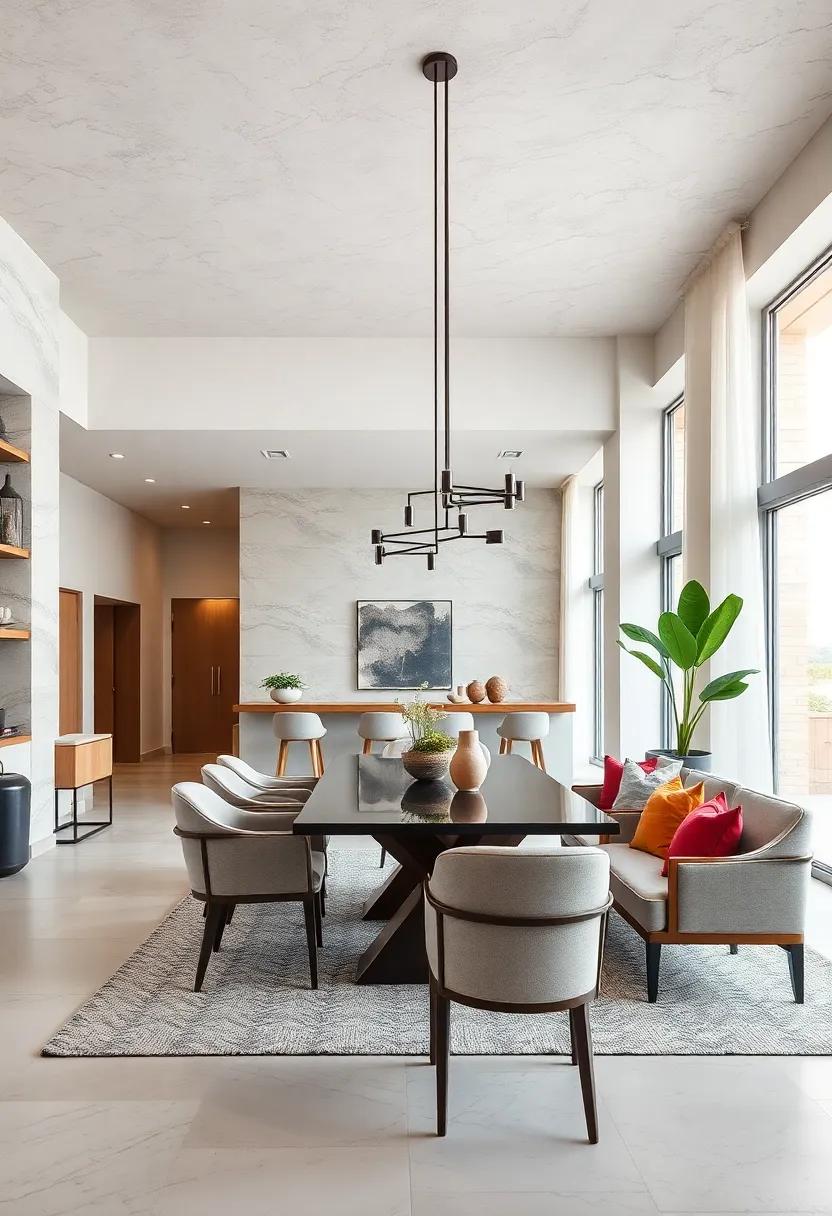
Embracing the essence of modern living, open-concept dining areas create an inviting atmosphere that effectively blurs the lines between functionality and style. this layout encourages a sense of togetherness, making it ideal for family gatherings or entertaining guests. to optimize the flow and maximize space, consider incorporating the following elements:
- Multi-functional furniture: Use extendable dining tables and stackable chairs to adjust seating as needed.
- Natural light: strategically place large windows or sliding doors to enhance brightness and make the space feel larger.
- Visual continuity: Choose a consistent color palette and material from the dining area to adjoining spaces, creating a seamless transition.
A well-designed open-concept dining area not only serves as a functional space but also elevates the overall aesthetic of the home. By incorporating unique décor choices, you can enhance the roomS character while maintaining a cohesive look. Here are some style considerations:
- Statement lighting: A bold chandelier or pendant lights can anchor the dining area and draw the eye.
- A pop of greenery: Adding indoor plants or floral arrangements can bring life to the atmosphere while purifying the air.
- area rugs: Define the dining space with a decorative rug that complements surrounding décor.
color Palette Inspirations: Finding the Right Hues for Your Dining Room Ambiance
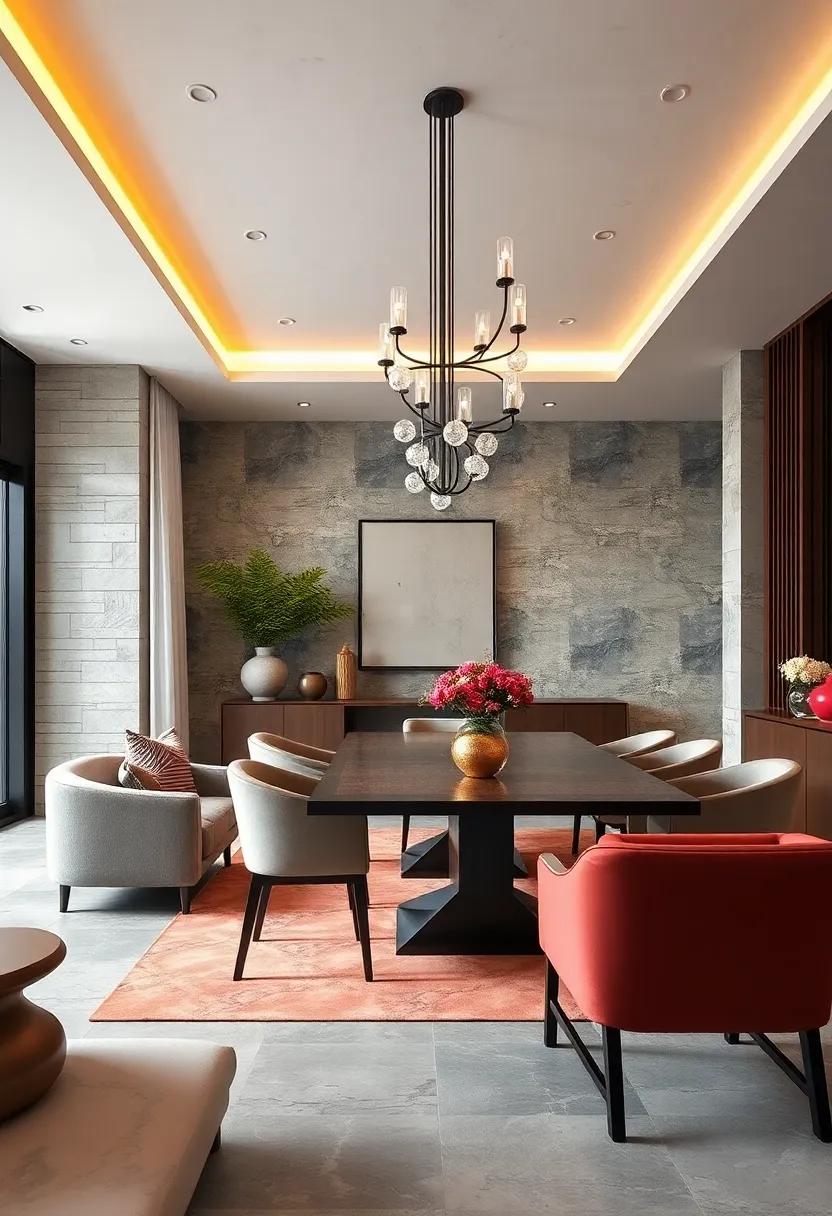
Choosing the right colors for your dining room can transform the space into an inviting haven, encouraging joyful meals and memorable gatherings. Cool hues such as soft blues and greens can create a serene habitat, making the room a calming oasis for family dinners. In contrast, warm tones like terracotta, mustard, and deep reds can stimulate appetite and foster lively conversations, adding a touch of vibrancy that livens up the dining experience. consider incorporating these colors through various elements including walls, furniture, and decor items like table runners and artwork.
To elevate your dining room, think about combining different shades to enhance visual interest. A harmonious blend of colors can bridge the gap between functionality and aesthetics. Here are a few color combinations to get inspired:
- Soft Gray with Turquoise Accents
- warm Beige paired with Olive Green
- Deep Navy complemented by Radiant Coral
- Charcoal with Burnt Orange
Utilizing a color palette that reflects your personal style can make the dining experience more enjoyable. Here’s a simple table showcasing popular color schemes and their associated moods:
| Color Scheme | Mood |
|---|---|
| Neutral Tones | Calm and Inviting |
| Earthy Colors | cozy and Grounded |
| Bold Colors | Energetic and Lively |
| Pastels | Soft and Gentle |
Statement Lighting: How Fixtures Can Transform the Dining Experience
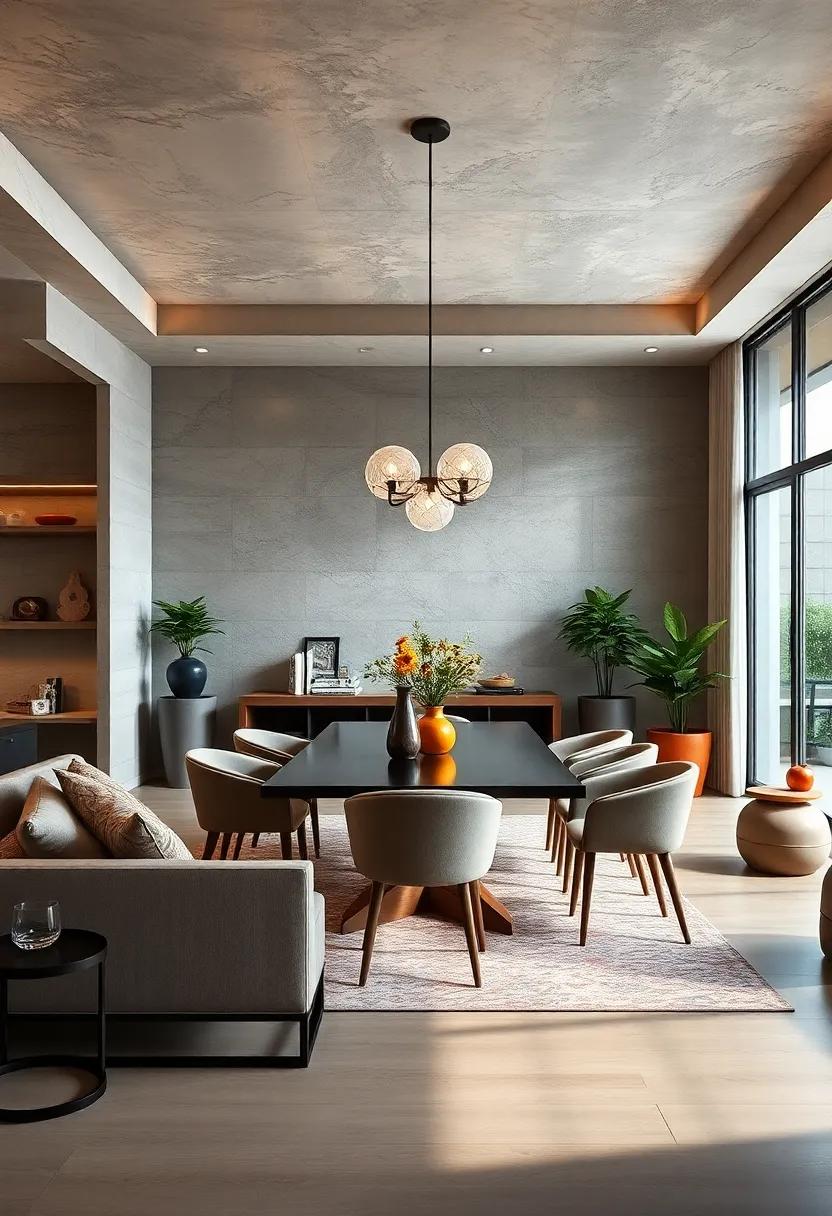
When it comes to dining spaces, the right lighting fixtures can elevate the mood and experience, creating an atmosphere that is both inviting and sophisticated. Statement lighting serves as more than just a source of illumination; it acts as the focal point of the room, drawing attention and sparking conversation. Consider bold, oversized chandeliers that echo the elegance of a formal dining experience or sleek, minimalistic pendant lights that enhance a modern aesthetic. Here are some options to consider:
- Chandeliers: Grandeur and elegance,perfect for a luxurious feel.
- pendant Lights: Versatile and contemporary, ideal for casual dining.
- Wall Sconces: Add warmth and intimacy,enhancing the overall ambiance.
- LED Strips: innovative and customizable; provide a modern twist.
In addition to the style of the fixtures, their placement and brightness play crucial roles in transforming your dining experience. Positioning lights directly above the dining table not only offers functional illumination for meals but also creates a cozy environment for gatherings. The table below illustrates various placement strategies against their intended moods:
BEST-SELLING PRODUCTS IN THIS CATEGORY
- ▪️ It contains an extensive collection of high-quality HD dining room design photos, both in portrait and landscape orientation.
- Used Book in Good Condition
| Lighting Placement | Intended Mood |
|---|---|
| Centered Over the Table | Inviting & Intimate |
| Multiple Fixtures | Dynamic & Engaging |
| Indirect Lighting on Walls | Warm & Welcoming |
By thoughtfully choosing and positioning your lighting, you can turn an ordinary dining room into a stunning space that complements your contemporary style while enhancing the overall dining experience.
Textures Galore: Incorporating Various Materials for Depth and interest
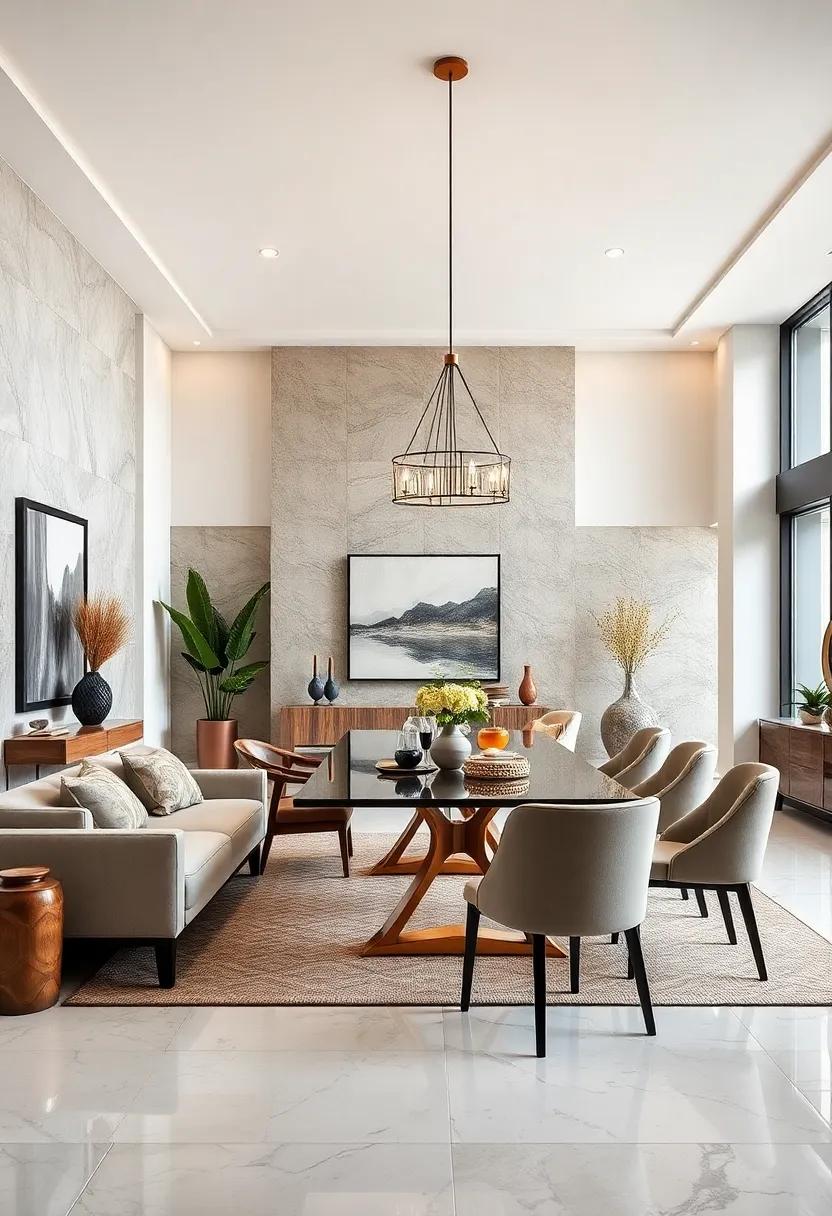
In contemporary dining room design, the interplay of materials can transform a simple space into an engaging environment. By integrating various textures, you can create an inviting atmosphere that captivates the senses. Consider mixing natural wood with metal accents, or soft textiles alongside stone surfaces. These combinations not only enhance visual interest but also contribute to the room’s warmth and character.For instance, a reclaimed wood dining table can be beautifully complemented by sleek metal chairs, while a woven rug can soften the ground beneath, bringing a cozy feel to the overall aesthetic.
To achieve a harmonious balance, it’s essential to curate your material choices carefully. Experiment with color palettes and finishes that highlight the unique attributes of each material.Utilize elements such as:
- Textured fabrics for chair cushions or window treatments
- Glossy porcelain dishes that reflect light
- Matte finishes on wood to emphasize its natural grain
- Glass elements to introduce openness and modernity
These layered textures create a visual dialog that invites guests to explore the space. A well-thought-out composition of materials not only enhances the aesthetics but also ensures functionality, catering to both everyday use and special occasions.
eco-Friendly Dining: Sustainable Choices for a Greener Eating Environment
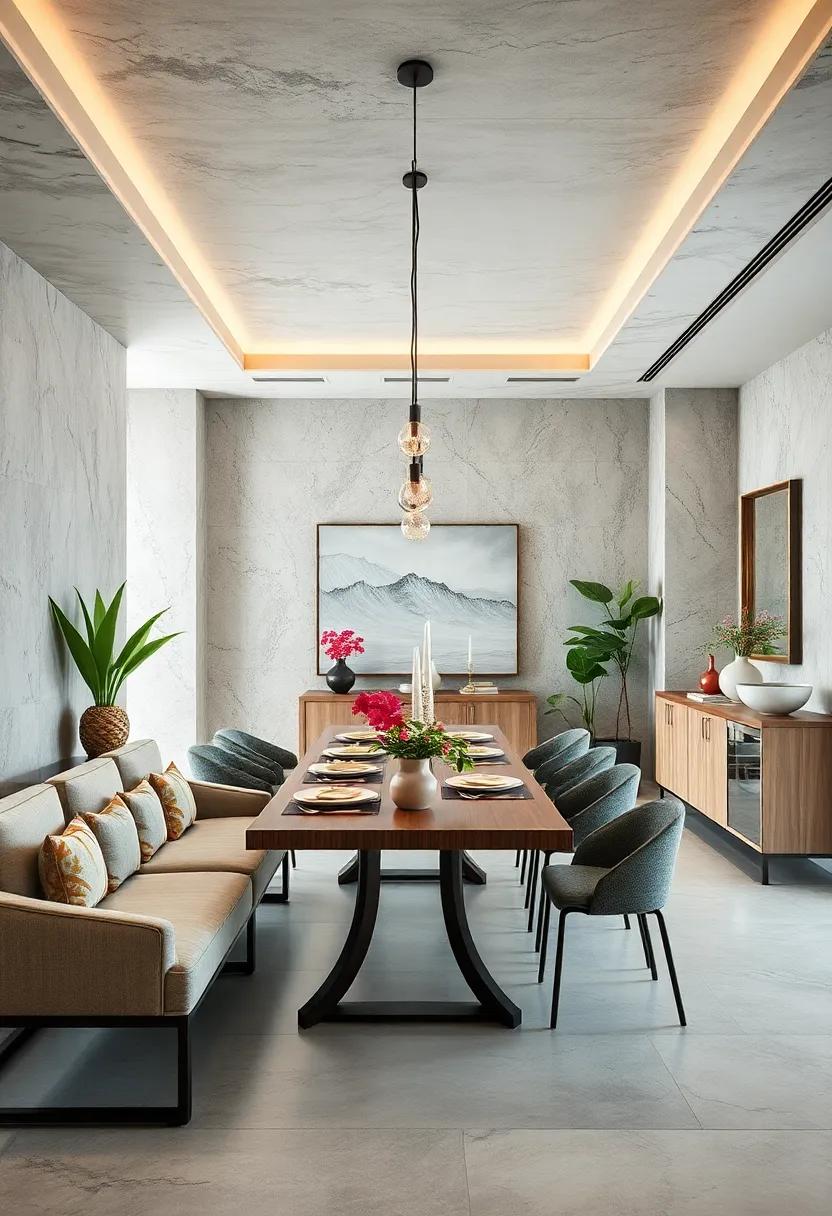
As more individuals and families commit to making sustainable lifestyle choices,the dining room emerges as a pivotal space for eco-friendly practices. Transitioning to sustainable dining isn’t solely about reducing waste; it encompasses a thoughtful selection of materials and ingredients that reflect a commitment to the environment. Utilizing items made from recycled materials, incorporating locally-sourced foods, and choosing seasonal produce not only enhances the dining experience but actively contributes to a healthier planet. Here are some key elements to consider:
- Bamboo or reclaimed wood furniture: These materials are not only durable but also reduce the demand for new resources.
- Energy-efficient lighting: LED options not only save energy but also come in styles that suit various aesthetics.
- Compost and recycling bins: Integrating these into your dining space encourages responsible waste management.
Moreover, choosing dinnerware and decorations that embrace eco-conscious values adds charm and character to a dining space. Opting for ceramic or glass dishes over plastic helps minimize single-use items, while organic fabrics for table linens create a welcoming atmosphere that resonates with environmental respect. Here’s a succinct overview of sustainable dining elements:
| Element | Benefits |
|---|---|
| Compostable Plates | Reduce landfill waste and are biodegradable. |
| Natural Fiber Tablecloths | Biodegradable and sustainable; offers a cozy feel. |
| Locally Sourced Ingredients | Supports local economy and reduces carbon footprint. |
Spatial Harmony: Balancing Furniture Placement for Optimal Flow
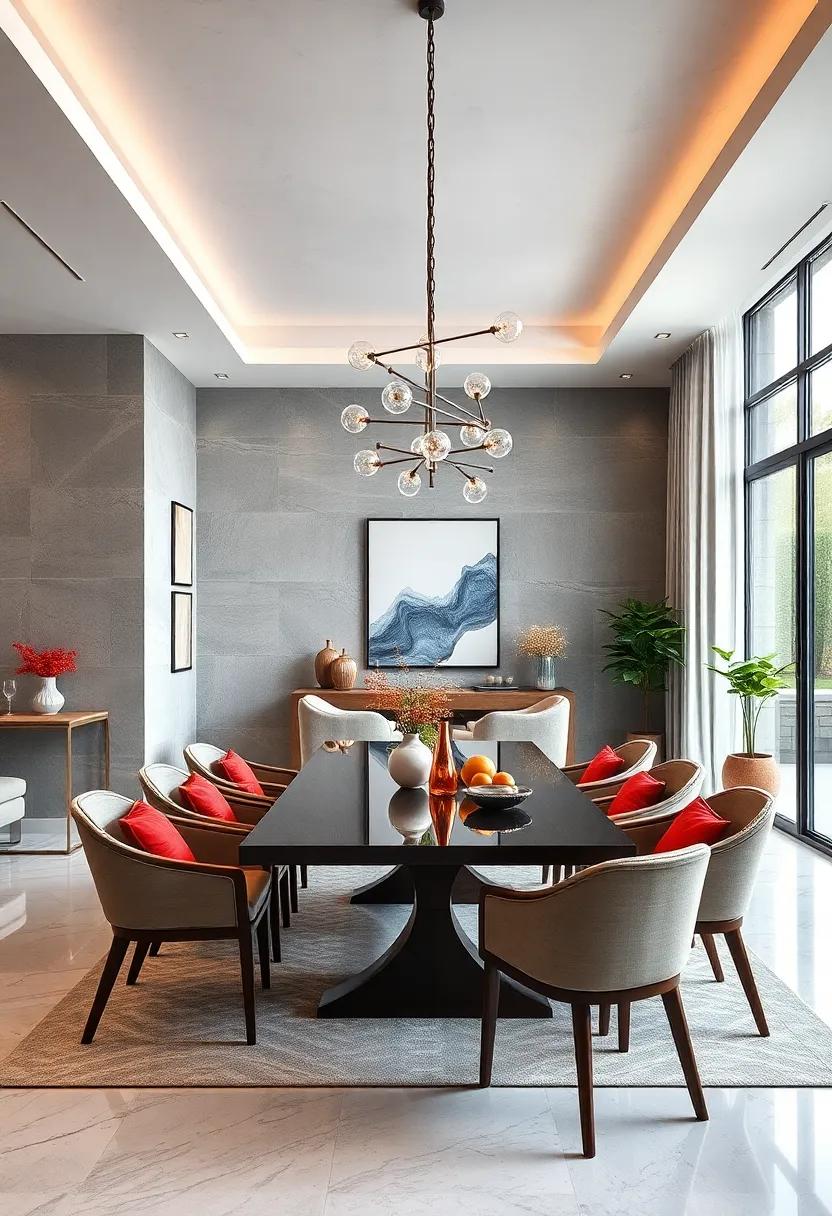
Creating a space where functionality meets aesthetics requires careful consideration of how furniture interacts within the room. To achieve optimal flow, ensure that essential pieces are positioned to encourage movement and interaction. Start by identifying key areas where traffic is highly likely to flow, such as the entrance, dining table, and any serving stations. Then, arrange the furniture to create inviting pathways. Key strategies include:
- Spacing: Maintain a minimum of 36 inches between larger pieces to allow easy navigation.
- Symmetry: Use balanced arrangements for a pleasing visual effect, notably in large dining areas.
- Focal Points: Arrange seating around a centerpiece, like a striking light fixture or artwork, to draw the eye.
Moreover, the size and scale of furniture play a pivotal role in achieving spatial harmony. Consider using a mix of larger, statement pieces with smaller accents to add depth and dimension to the dining room. A well-sized dining table should encourage conversation while allowing enough room for dining chairs to slide in and out comfortably. Additionally, the height of fixtures and furnishings should complement one another, facilitating an inviting atmosphere. here’s a simple table to help visualize key furniture dimensions:
| Furniture Item | Recommended Dimensions | Ideal Arrangement |
|---|---|---|
| Dining Table | 60-72 inches long | Centered in the room |
| Dining Chairs | 18 inches wide | At least 24 inches apart |
| Sideboard | 36 inches tall | Against a wall for easy access |
Cultural Influences: Infusing global Trends into Contemporary Dining Styles
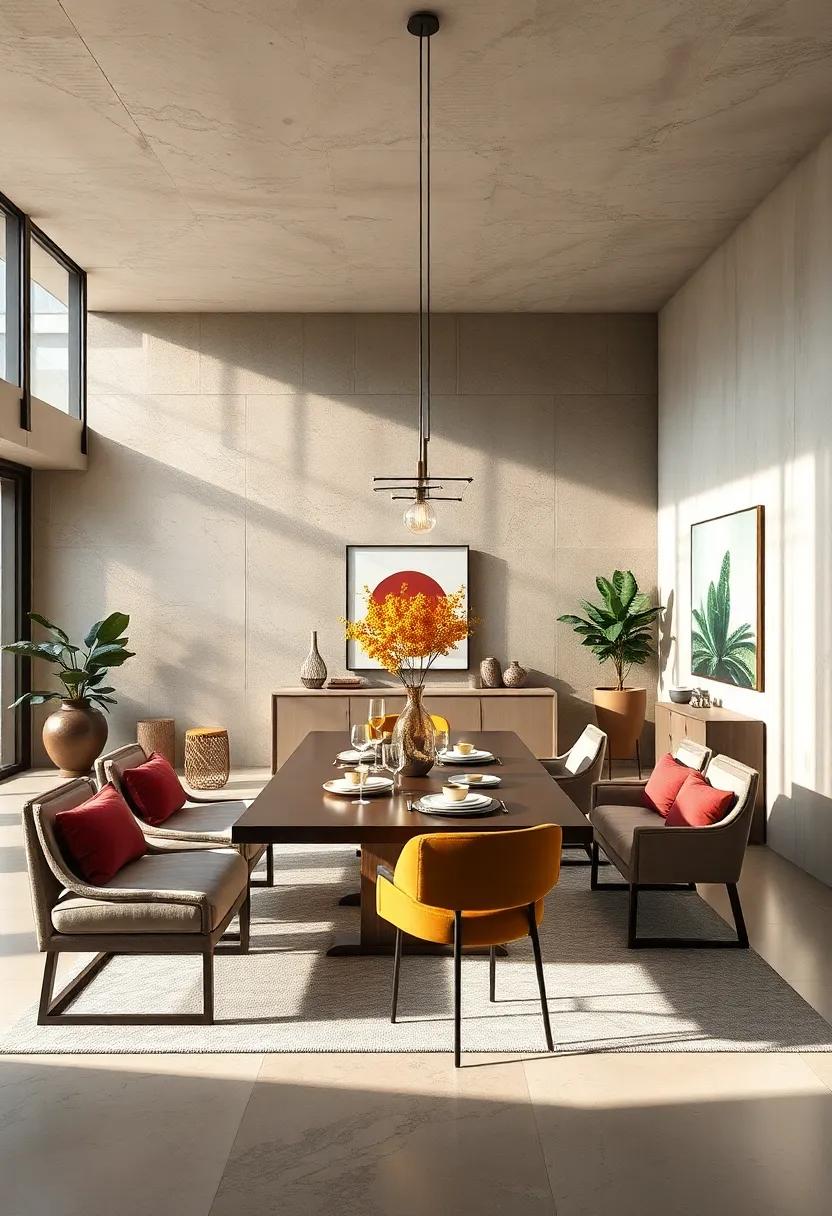
The dining room has evolved into a dynamic space that reflects not just individual tastes but also the vibrant influences of global cultures. With the rise of travel and digital connectivity, contemporary dining styles are increasingly marked by an eclectic mix of aesthetics drawn from around the world. Scandinavian minimalism, Japanese Zen, and Mediterranean warmth are just a few of the trends shaping modern dining experiences. this blend invites an array of textures and materials, creating harmonious environments that are both visually appealing and practical.
Incorporating elements from diverse cultures can be achieved through various means. Here are some key influences:
- Textiles: Use of vibrant fabrics or intricate weaves that tell a story, such as ikat or batik.
- Furniture: Mixing styles, such as pairing sleek Scandinavian chairs with rustic farmhouse tables.
- Lighting: Global-inspired fixtures like Moroccan lanterns or Japanese paper lamps create atmospheric settings.
- Art: Featuring local artworks or globally-inspired pieces fosters a sense of place and identity.
Moreover, the design of dining spaces has taken on a more functional approach, harmonizing tradition with modern demands. By using key principles like open layouts and multifunctional furniture, dining areas can seamlessly transition from casual family meals to sophisticated dinner parties. A recent trend is the integration of technology, with features like smart tables and adjustable lighting systems enhancing both experience and usability. These innovations not only cater to aesthetic desires but also address practical needs, making dining a shared experience that resonates on both personal and global levels.
Functional Aesthetics: Designing a Dining Room That Works as Hard as It Looks
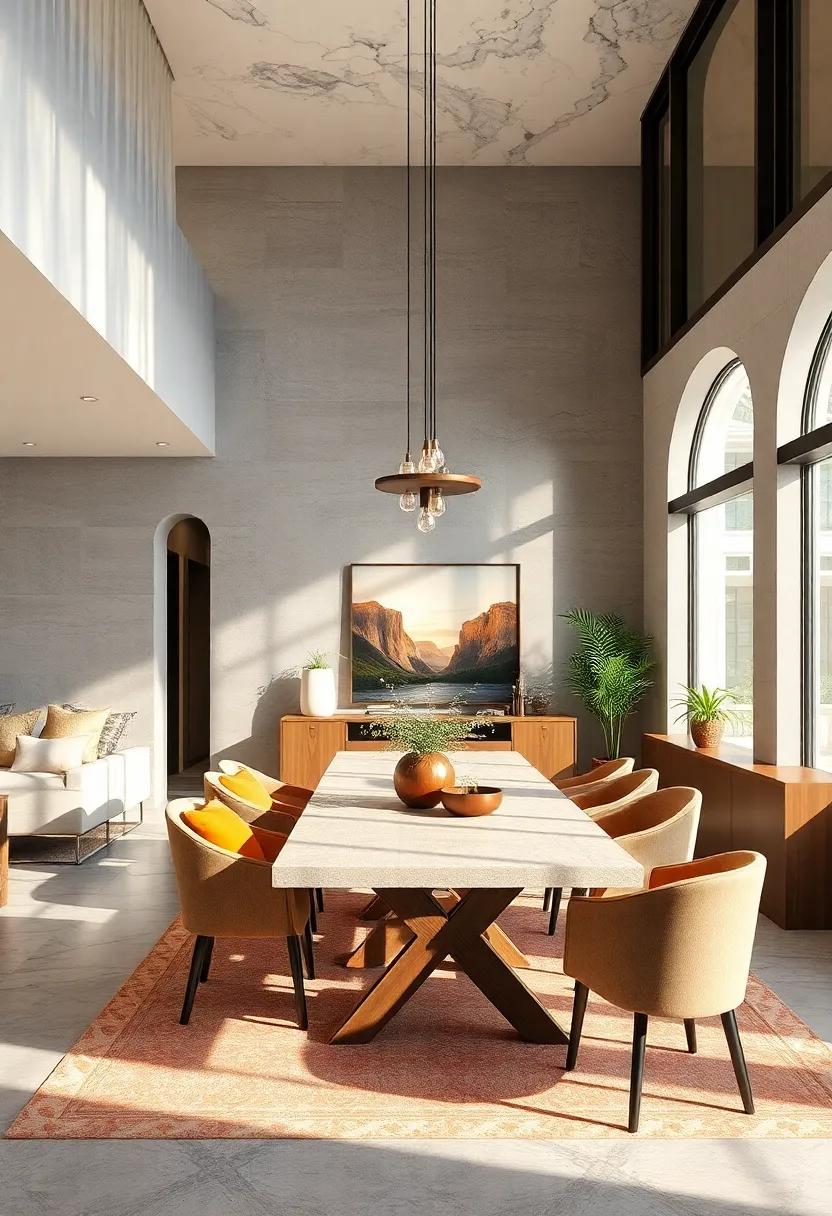
In crafting a dining room that seamlessly marries form and function, it is essential to prioritize elements that enhance both usability and style. Begin by considering an adaptable layout that encourages conversation while accommodating different group sizes. Key design features could include:
- Multi-functional furniture: Opt for extendable tables or benches with built-in storage to maximize space and versatility.
- Durable materials: Choose surfaces that are not only gorgeous, such as wood or glass, but also resilient against spills and everyday wear.
- Thoughtful lighting: Incorporate layered lighting options, including pendant lights, wall sconces, and dimmable features to create an ambiance suitable for any occasion.
Integrating technology can also elevate your dining experience. Consider these modern conveniences that blend seamlessly into contemporary designs:
| Feature | Description |
|---|---|
| Smart Dining Tables | Tables equipped with built-in charging ports and Bluetooth speakers for a connected dining experience. |
| Automated Lighting Systems | Smart lighting that adjusts brightness and color temperature based on the time of day. |
| Glassware with Sensors | Innovative glassware that tracks consumption and offers drink recommendations based on the meal. |
The Power of Art: Using Wall Decor to enhance the Dining Atmosphere
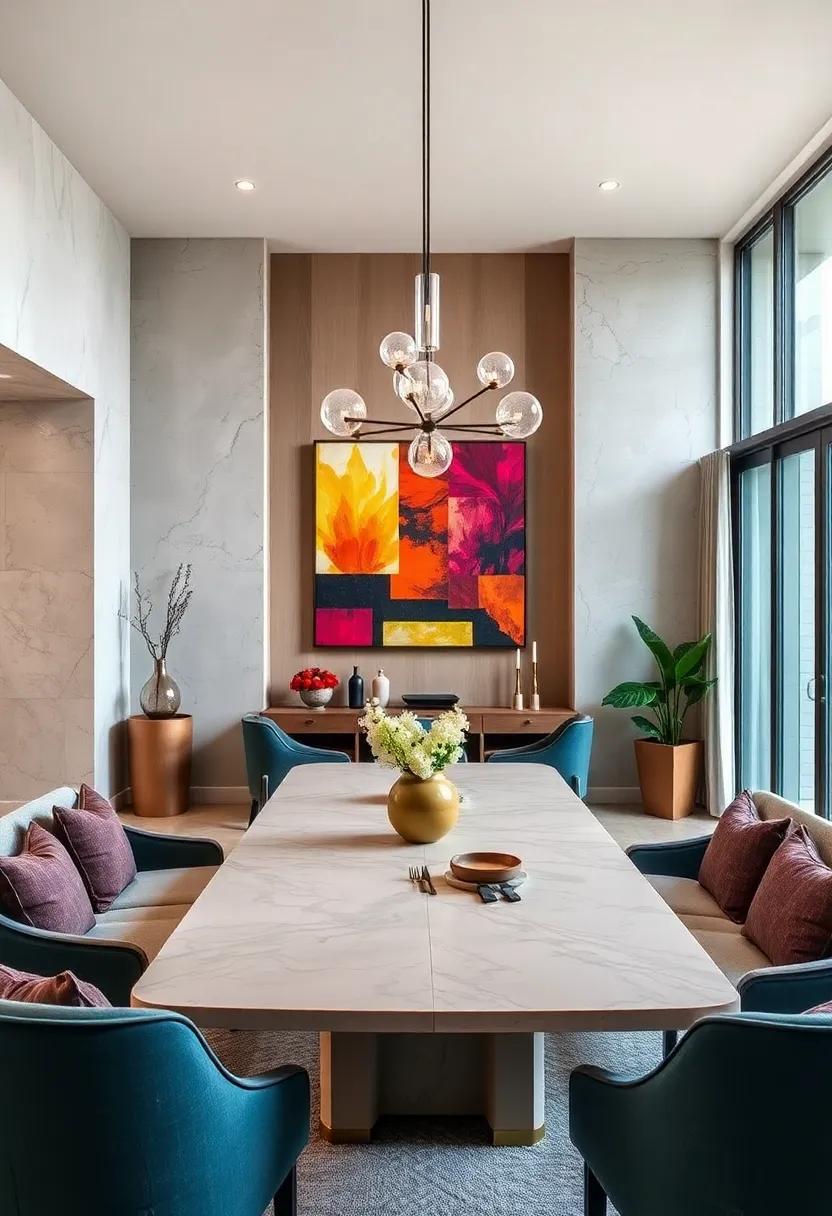
Wall decor serves as a powerful tool in transforming the dining atmosphere, adding depth and personality to the space. By selecting art pieces that resonate with your style, you can create a focal point that enhances the overall dining experience. Consider using a mix of textures, colors, and shapes to bring vibrancy and life to the walls. Here are some ideas for impactful wall decor:
- Gallery Walls: Curate a collection of framed art, photographs, or prints that reflect your journey and taste.
- Statement Mirrors: Utilize oversized mirrors to create an illusion of space and to reflect light, adding to the ambiance.
- Textile Art: Incorporate woven wall hangings or fabric art pieces for a cozy, inviting touch.
choosing pieces that carry personal significance can foster connection among diners, turning meals into memorable experiences.While selecting art, consider styles that embody your dining room’s design aesthetic, whether it be minimalist, rustic, or eclectic. Below is a simple table outlining different styles of wall decor and their corresponding themes that can enhance your dining area:
| Wall Decor Style | Theme |
|---|---|
| Abstract Art | Modern Elegance |
| Vintage Posters | Nostalgic Charm |
| Botanical Prints | Natural Serenity |
| Framed Quotes | Inspirational atmosphere |
Seating Solutions: Choosing the Right Chairs for Comfort and Style
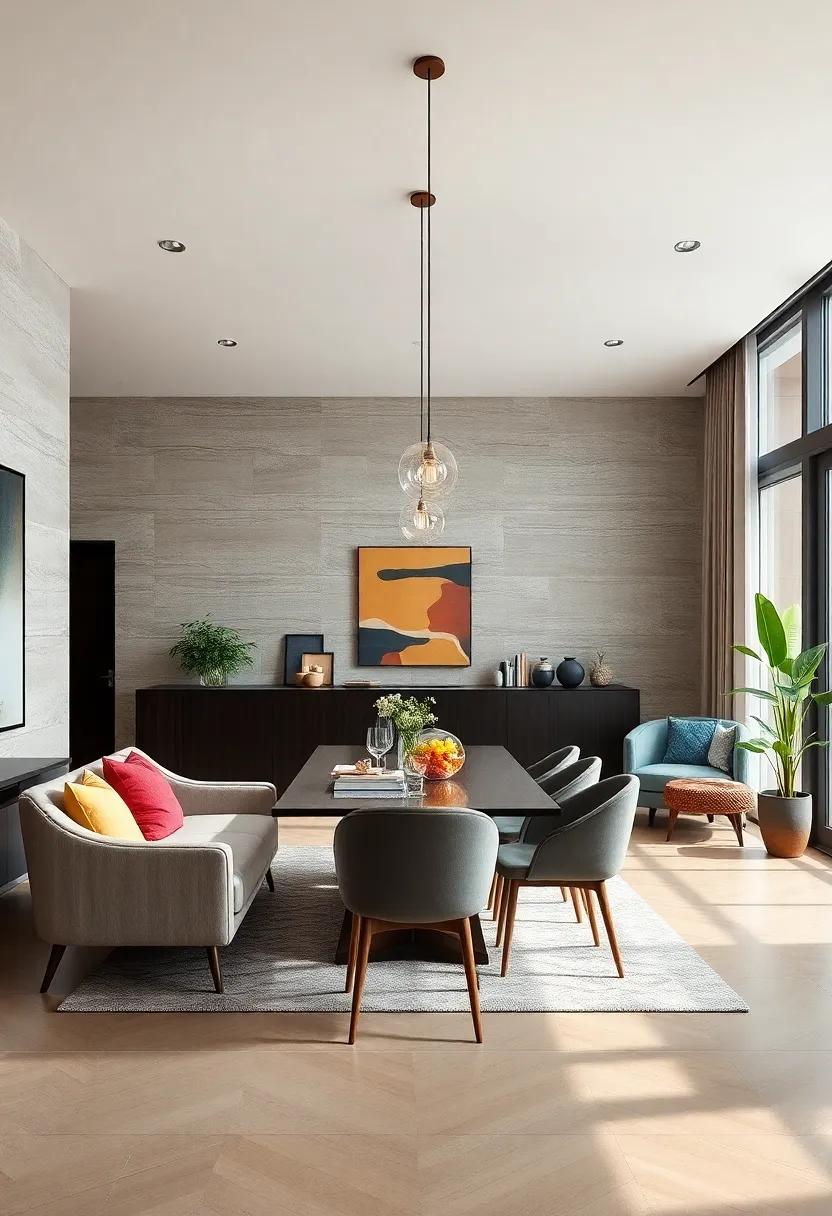
When it comes to creating an inviting and stylish dining space, the selection of chairs plays a pivotal role in achieving both comfort and aesthetic coherence. Modern dining chairs come in various shapes, materials, and colors, offering limitless possibilities to enhance your room’s vibe. Whether you opt for sleek metal frames or rich wooden structures, consider the following elements to maximize enjoyment during meals:
- Ergonomics: Ensure the chair supports a natural seated position, allowing guests to enjoy prolonged meals without discomfort.
- Materials: Choose chairs made from durable materials that complement your table and overall decor.
- Style & Design: Select a design that echoes your dining room theme, whether it’s minimalist, industrial, or rustic.
A versatile dining chair can also serve as an art piece, lending a unique flair to your space. Assess the color palette of your dining room to select chair hues that either stand out or harmonize beautifully with existing elements. Consider integrating various styles through a mixed seating arrangement, which can create visual interest while catering to diverse comfort preferences. To make an informed choice, you might consider the following characteristics:
| Characteristic | Importance | Examples |
|---|---|---|
| Height | Ensures comfort at the dining table | Counter-height, Standard height |
| Weight Capacity | Durability and safety | Supports various body types |
| Style Compatibility | Enhances room cohesion | Mid-century, Contemporary, Eclectic |
The Role of Rugs: Grounding Your Dining Room with Style and Substance
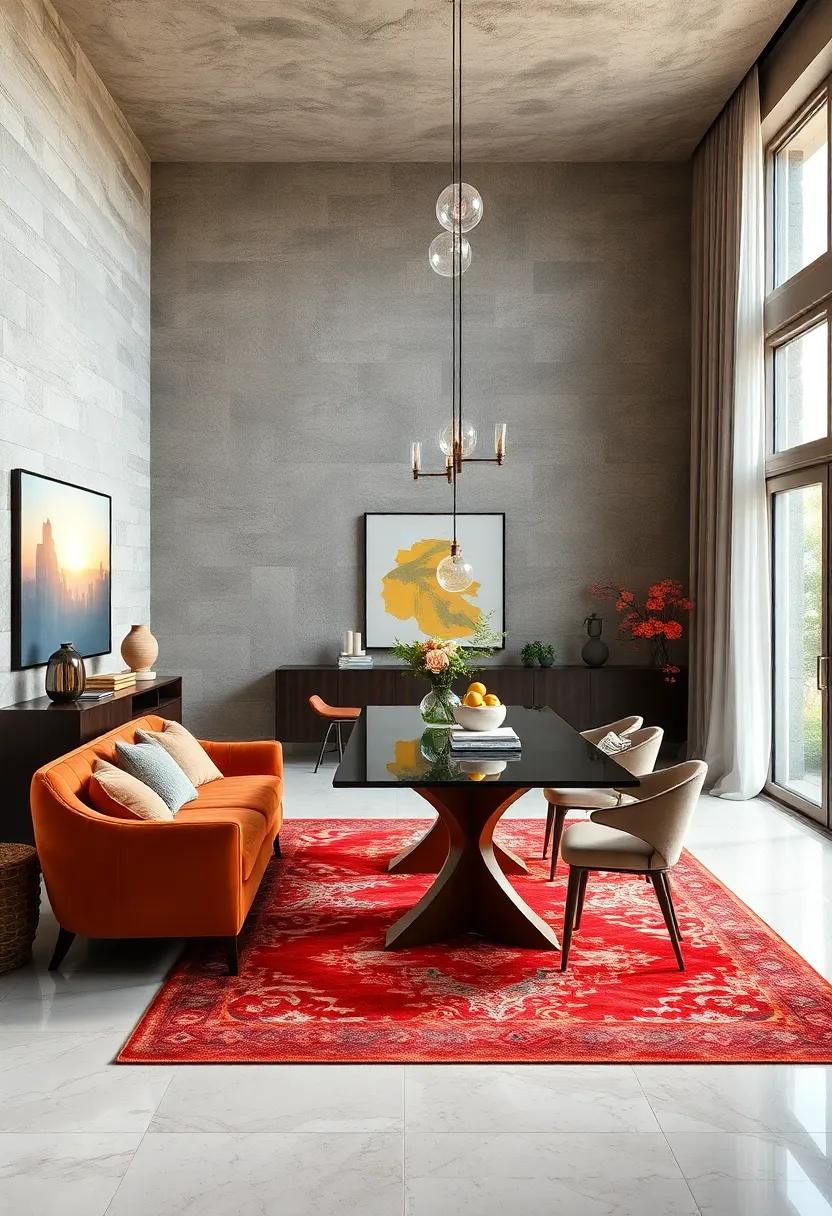
In the sophisticated landscape of modern dining rooms, the use of rugs transcends mere decoration, becoming an essential tool for creating an inviting atmosphere. A well-chosen rug can serve as a focal point, drawing the eye and harmoniously tying together diverse design elements. the right rug not only adds a layer of texture and warmth but also helps to demarcate the dining area,contributing to the overall flow of the space. Consider these factors when selecting the perfect rug for your dining room:
- Size: Choose a rug that is large enough to accommodate all dining chairs, even when pulled out.
- Material: Opt for durable materials that can withstand spills and heavy foot traffic.
- Style: Select a design that complements the surrounding decor and enhances the room’s aesthetic.
The practical benefits of incorporating a rug into your dining room extend beyond aesthetics. Rugs can definitely help to absorb sound, adding a softening touch to the overall acoustics of the space, making meals more enjoyable and conversations more intimate. Moreover, they bring an element of comfort, encouraging prolonged gatherings and shared memories around the table. For an effective combination of style and substance, examine the following table that highlights popular dining room rug materials:
| Material | Benefits |
|---|---|
| Wool | Durable and stain-resistant; provides a luxurious feel. |
| Jute | Eco-friendly; adds a natural texture and warmth. |
| Synthetic Fiber | Easy to clean; offers a variety of patterns and colors. |
| Cotton | Soft and versatile; suitable for more casual settings. |
Outdoor Inspiration: Integrating Nature into Indoor Dining Spaces
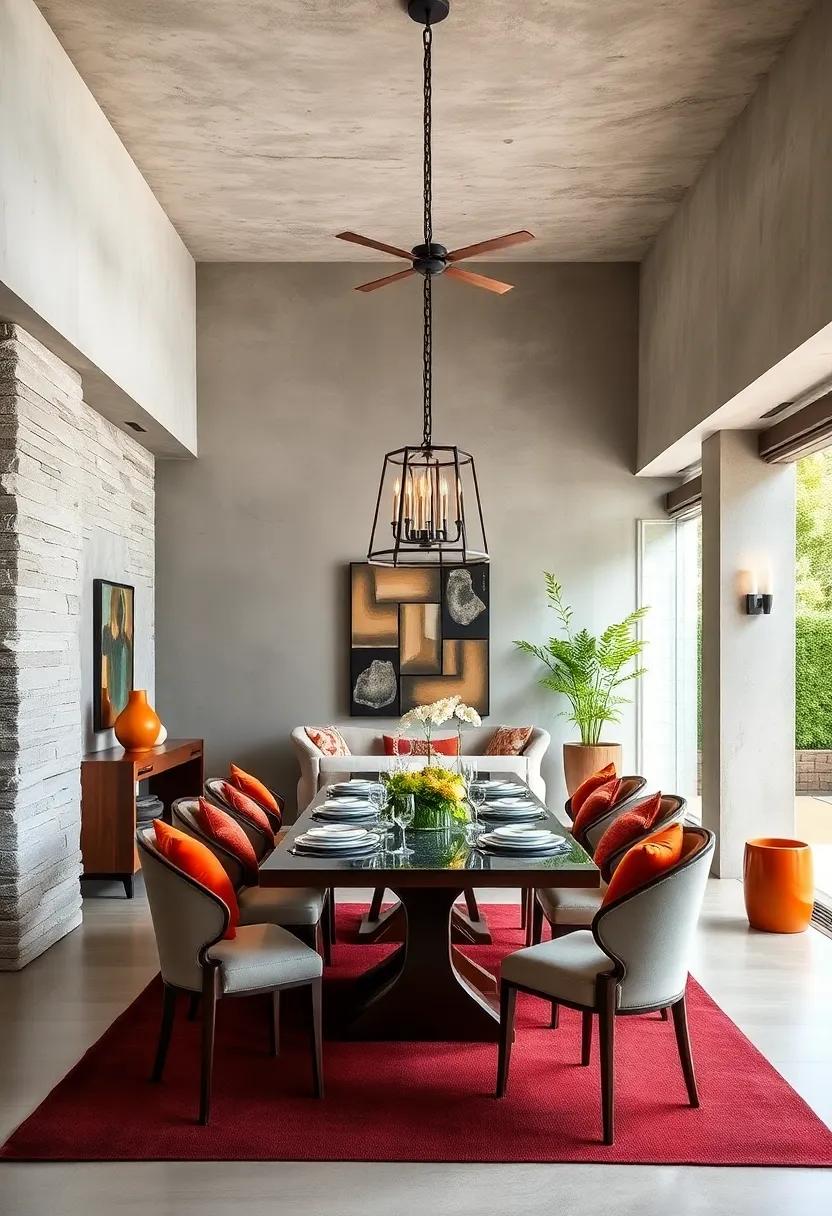
Transforming indoor dining areas into serene retreats reminiscent of the great outdoors is an innovative way to elevate both aesthetics and functionality. One effective approach is to incorporate natural materials such as wood, stone, and organic textiles, which can definitely help create a warm and inviting atmosphere. Consider these elements:
- Wooden Furniture: Opt for dining tables and chairs crafted from reclaimed or sustainably sourced timber.
- Stone accents: Integrate stone tabletops or backsplash features to add a touch of rugged elegance.
- Textured Fabrics: Use linen, cotton, or wool in earthy tones for table linens or seat cushions.
In addition to materials, the color palette plays a crucial role in bridging indoor dining with an outdoor vibe. Emphasizing greens, browns, and soft neutrals can enhance the connection to nature. Here’s how you can bring this concept to life:
| Element | Color Suggestions |
|---|---|
| Walls | Soft Sage Green, Creamy Beige |
| Accent Decor | Terracotta, deep Charcoal |
| Tableware | Muted Earth Tones, Warm Whites |
Personal Touches: Infusing Your Personality into Dining Room Decor
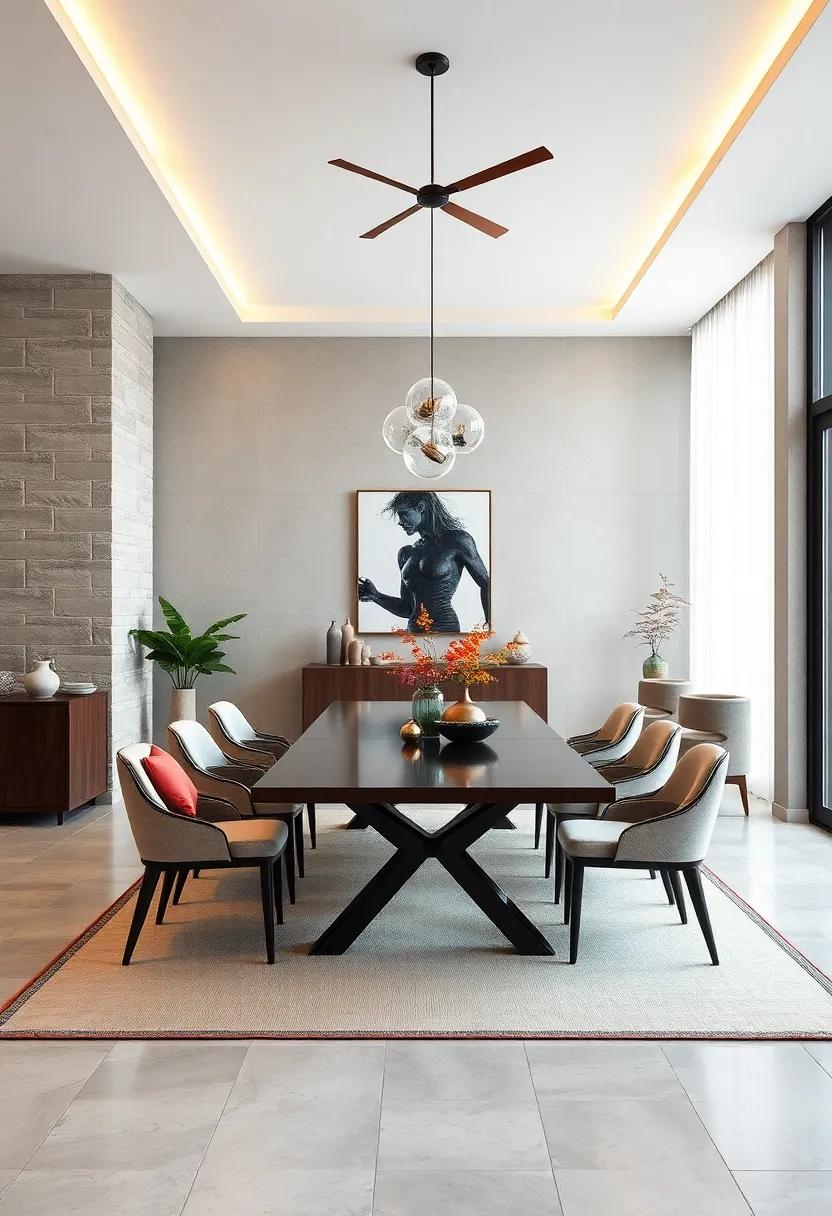
Incorporating personal elements into your dining room decor can transform the space from merely functional to a true reflection of your individuality. By selecting items that resonate with your personal history or interests, you can create an environment that feels both inviting and uniquely yours. Consider displaying a curated collection of memorabilia, such as travel souvenirs or family heirlooms, that tell a story. Complement these with small artistic touches, like handcrafted tableware or bespoke centerpieces, that add character and warmth to the atmosphere.
To further infuse your personality, think about the color palette and textures that speak to you. Choose bold hues that inspire energy, or softer shades that evoke serenity, depending on the vibe you want to create. Combine various materials like wood,metal,and fabric to add layers of visual interest. Here are some suggestions to personalize your dining room:
- Artwork: Hang pieces that resonate with your style,whether modern abstracts or classic landscapes.
- Textiles: Use cushions or table runners that feature patterns or colors you love.
- Plants: Incorporate greenery that reflects your lifestyle, from low-maintenance succulents to vibrant flowers.
Below is a simple table to visualize color and texture combinations that can enhance your dining room’s ambiance:
| Color Palette | Texture | Suggested accessories |
|---|---|---|
| Warm Earth Tones | Gold Accents | Ceramic Plates |
| Cool Blues and Greens | Soft Fabrics | Canvas Wall Art |
| Bold Reds and Blacks | Wood Textures | Metal Candle Holders |
The Rise of the multi-Use Dining Room: Versatile Spaces for Modern Homes
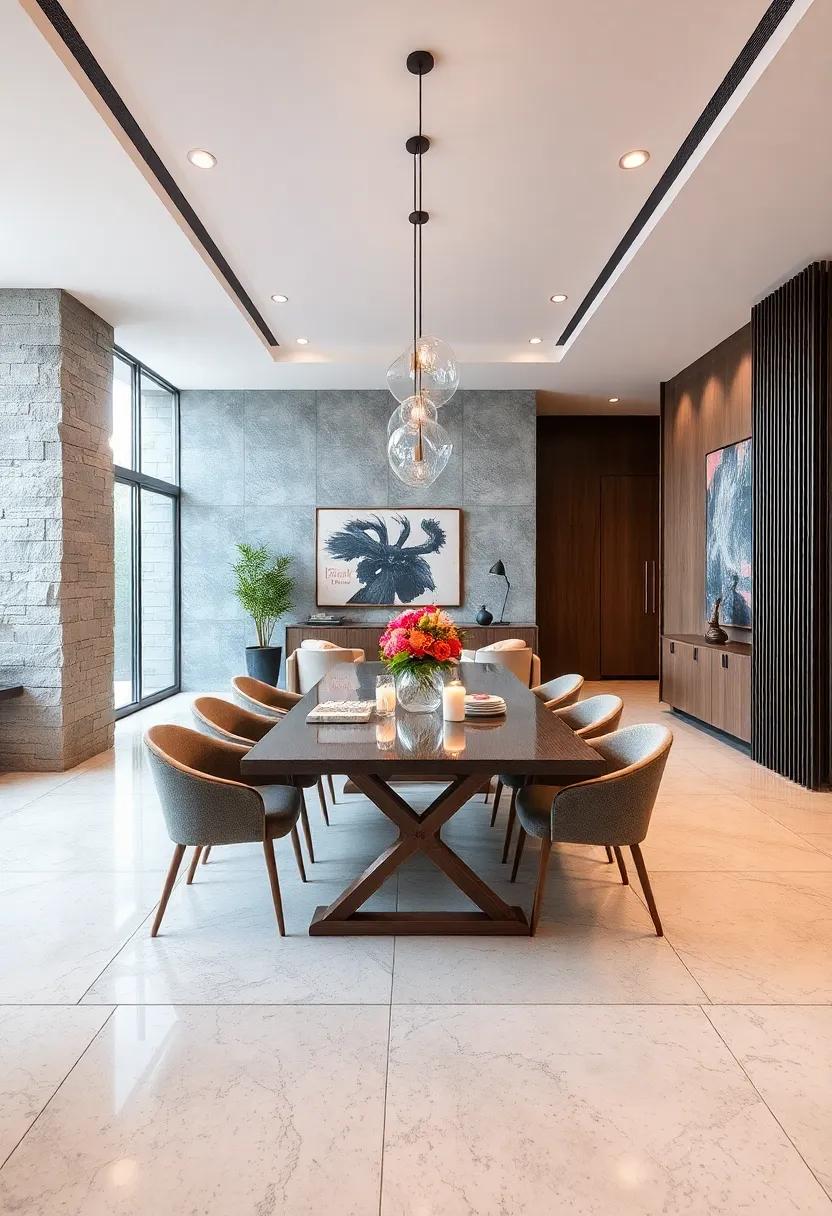
The modern home is evolving, and so is the way we think about our living spaces.The traditional dining room is being reimagined as a multi-use area that serves various purposes, from family gatherings to remote work sessions. This transformation encourages homeowners to curate spaces that reflect their lifestyles and accommodate the demands of everyday life. Key features of these versatile dining areas often include:
- Flexible furniture arrangements, such as extendable tables and stackable chairs.
- Integrated technology with charging stations and smart home functionality.
- Aesthetic elements like artwork and decor that can be easily updated to keep the space fresh.
Moreover, the incorporation of multifunctional designs allows the dining room to blend seamlessly into adjacent areas, creating a harmonious flow throughout the home. For instance, open-concept layouts are gaining popularity, where the dining area serves as a bridge between the kitchen and living room. A few contemporary styles that exemplify this trend include:
| Style | Description |
|---|---|
| Scandinavian | Emphasizes minimalism with light wood furnishings and a neutral color palette. |
| Industrial | features raw materials like metal and reclaimed wood,offering an urban chic vibe. |
| Modern Farmhouse | Combines rustic elements with contemporary flair, creating a warm and inviting atmosphere. |
Table Talk: Selecting the Perfect Dining table That Speaks to Your Design
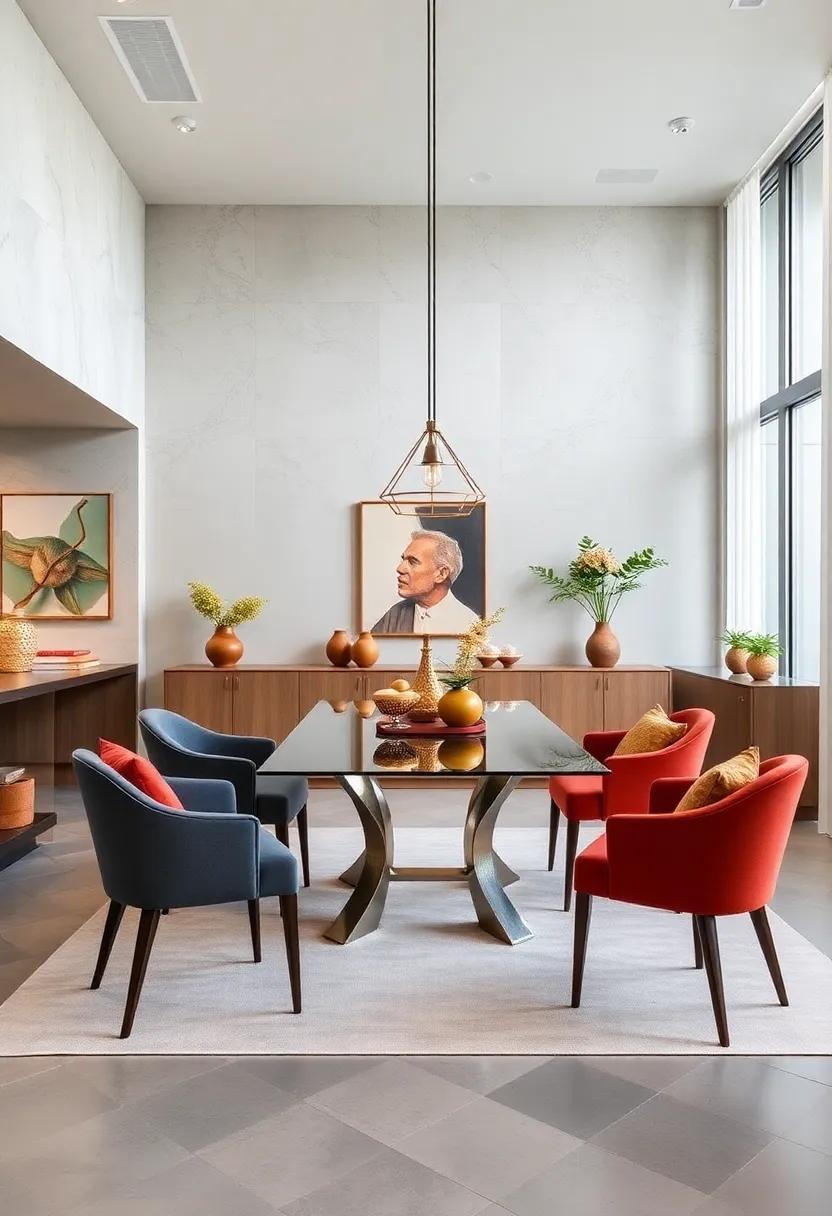
Choosing the right dining table is crucial in creating a harmonious dining space that reflects your style. When selecting a table, consider the following factors to ensure it complements your interior design:
- Size: Make sure the table fits comfortably in your dining area, allowing enough space for movement.
- Material: From sleek glass to warm wood, material dictates the table’s vibe. Choose one that resonates with your overall decor theme.
- Shape: Rectangular, round, or square—each shape serves different purposes. round tables promote intimacy, while rectangular tables can accommodate larger gatherings.
- Style: Whether you prefer modern minimalism or vintage charm,the table should reflect your unique aesthetic.
Once you’ve identified your preferences,it’s vital to pair the table with the right accessories and chairs to create a cohesive look. Consider accentuating the table with a statement centerpiece or a stylish table runner. It can also be beneficial to look at color coordination and texture. A dark wooden table,such as,can be beautifully contrasted with lighter,softer upholstery to create a balanced visual appeal.here’s a rapid reference table to guide you:
| Table Shape | Best For | Styling Tips |
|---|---|---|
| Round | Small spaces | use with light seating |
| Rectangular | Large gatherings | Complement with contrasting accents |
| Square | Intimate dining | Pair with plush cushions |
seasonal Styles: Adapting Your Dining Room Aesthetics Throughout the Year
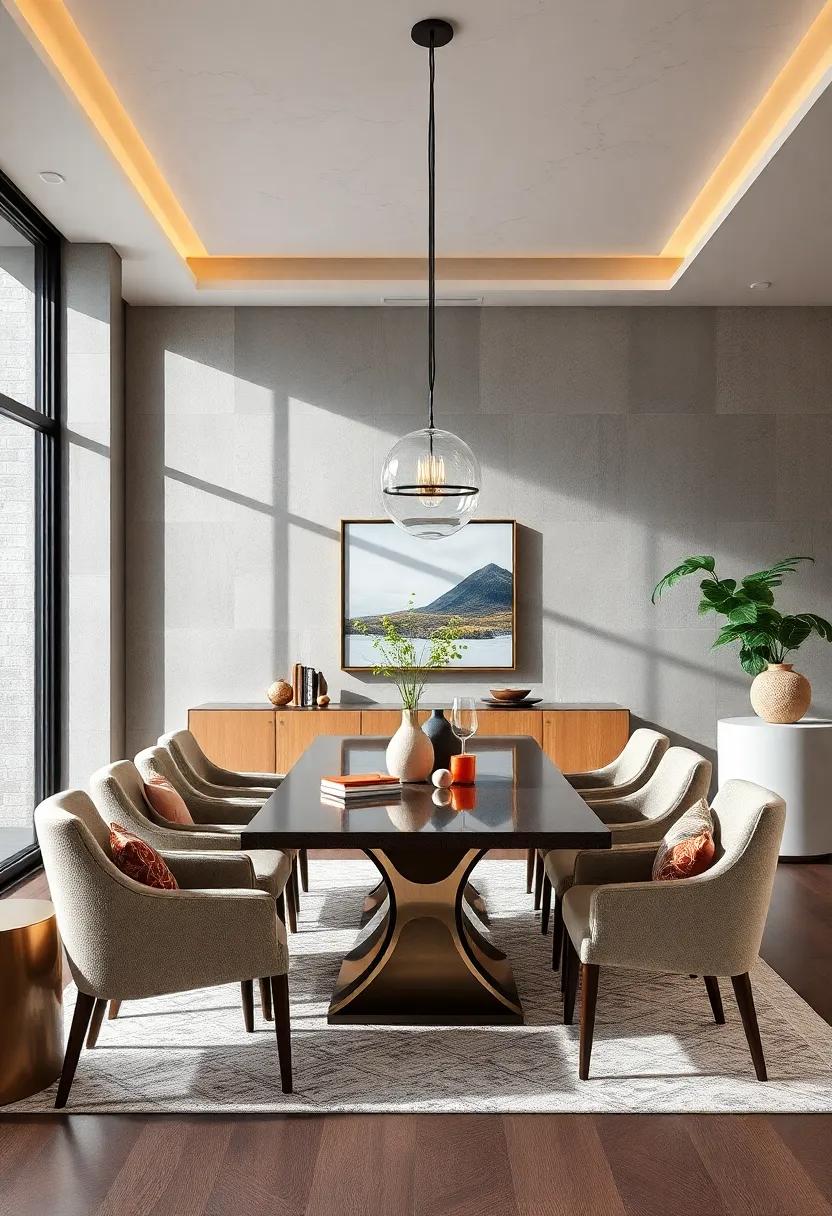
Transforming your dining room aesthetics with each season can breathe new life into your space, making it a delightful setting for gatherings and meals.In the spring, introduce fresh blooms and pastel table linens, creating an atmosphere that resonates with renewal. Consider incorporating elements such as:
- Floral Centerpieces: Use seasonal flowers to add color and vibrance.
- Light Fabrics: Opt for airy table runners and napkins in soft hues.
- Natural Accents: Bring in wooden or wicker accessories to connect with nature.
As summer arrives, let in the sunshine with brighter colors and outdoor-inspired decor. Play with elements that evoke a sense of warmth and freedom. Key features to consider include:
- Bold Tableware: Use colorful plates and glassware that reflect the sunny vibe.
- Open Spaces: Rearrange furniture for a more relaxed,airy feel.
- Textured Fabrics: Incorporate linen or cotton tablecloths to enhance the summery atmosphere.
Dynamic Centerpieces: Crafting Focal Points that Spark Conversation
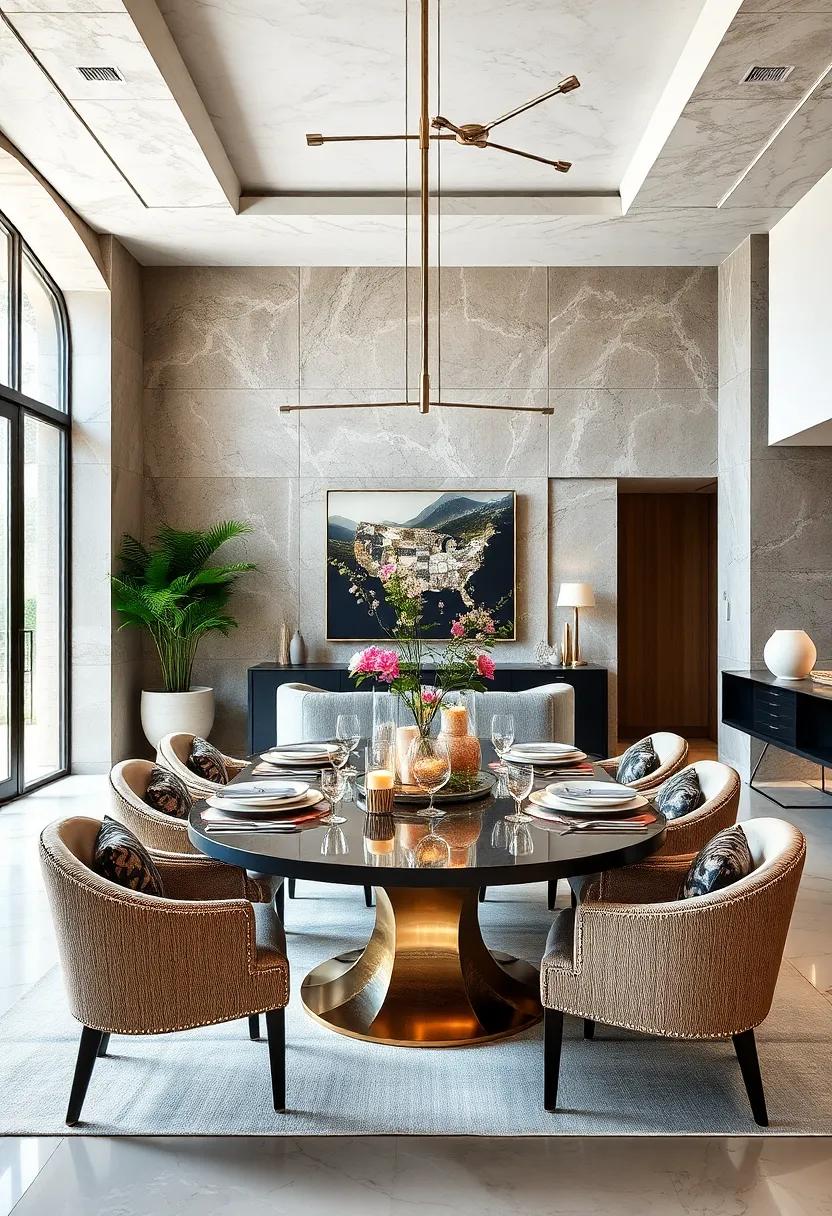
In contemporary dining rooms, dynamic centerpieces have become essential elements that not only catch the eye but also inspire dialogue among guests.Curating a centerpiece involves selecting pieces that resonate with the overall theme of your space while offering a dash of intrigue. Consider incorporating a mix of materials and heights to create a visually appealing arrangement. Here are some ideas to help you craft a conversation-starting focal point:
- Artistic Sculptures: Choose a unique sculpture that reflects personal taste or cultural significance.
- Seasonal Florals: Swap out flowers with the seasons to keep the centerpiece fresh and relevant.
- Rustic Elements: Use natural materials like wood or stone for a warm, inviting aura.
- Interactive Pieces: Incorporate items like a board game or a puzzle for guests to engage with during meals.
The arrangement can be further elevated by considering the shape and size of the dining table. Mixing various sizes of vessels can create depth and interest; for example, pairing a tall, slender vase with shorter, round bowls can draw the eye across the table. Implementing a table runner or placemats can also ground the arrangement while providing structure. To explore a range of potential compositions, refer to the table below:
| Type of Centerpiece | Style | Best For |
|---|---|---|
| Floral Arrangement | Colorful & Textured | Elegant Dining |
| Candle Display | Warm & Cozy | Intimate Dinners |
| Fruit Bowl | Natural & Vibrant | Casual gatherings |
| Art Piece | Bold & Statement | Modern Homes |
Smart Technology: Integrating Modern Conveniences into Dining Experiences
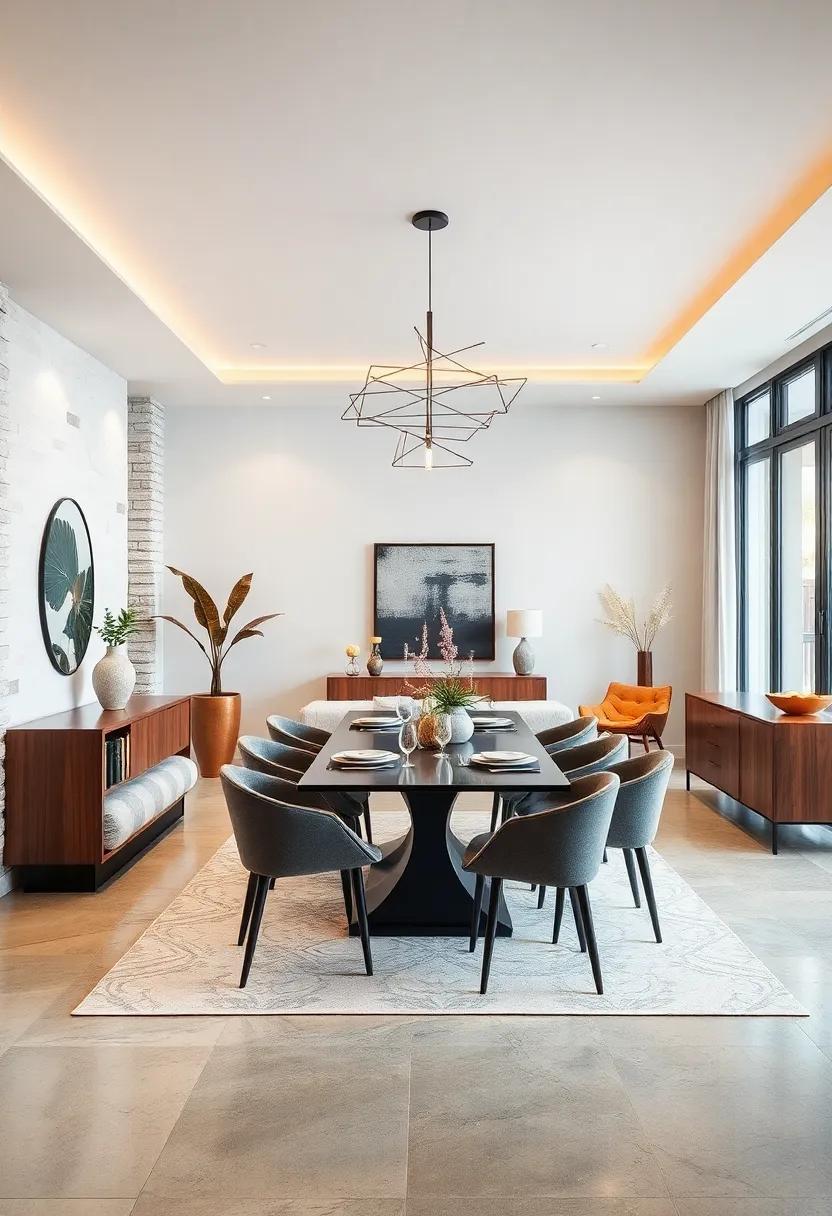
Modern dining experiences have transformed into a blend of aesthetic elegance and cutting-edge functionality, as smart technology paves the way for innovation. Interactive table surfaces equipped with touch controls allow diners to adjust lighting, music, and even the temperature—all at their fingertips. Smart appliances, such as voice-activated ovens and refrigerators, add layers of convenience, making meal prep an effortless endeavor. Here are some elements that enhance the dining experience:
- Smart Lighting: Automatically adjusts to match the mood of your gathering.
- Wireless Charging Tables: Convenient for keeping devices powered during meals.
- Integrated Music Systems: Allows seamless transition between playlists for different occasions.
Furthermore, technology extends beyond mere convenience, influencing the aesthetic value of dining spaces.Mood-enhancing LEDs can bathe the room in colors that reflect the season or theme of your gathering,while smart glass technology enables transparency adjustments for privacy or ambiance control. Consider a layout that incorporates tech seamlessly, enhancing both form and function:
| Smart Feature | Functional Benefit | Aesthetic Contribution |
|---|---|---|
| Smart Tablecloths | Heat-resistant, stain-proof | Color-changing designs for theme adaptation |
| Augmented Reality Menus | Interactive experience for guests | Visually appealing and engaging |
| Voice-Controlled Assistants | hands-free management of dining tasks | Sleek, modern devices that complement decor |
Creating a Cozy Nook: the Rise of Intimate Dining Areas for Small Spaces
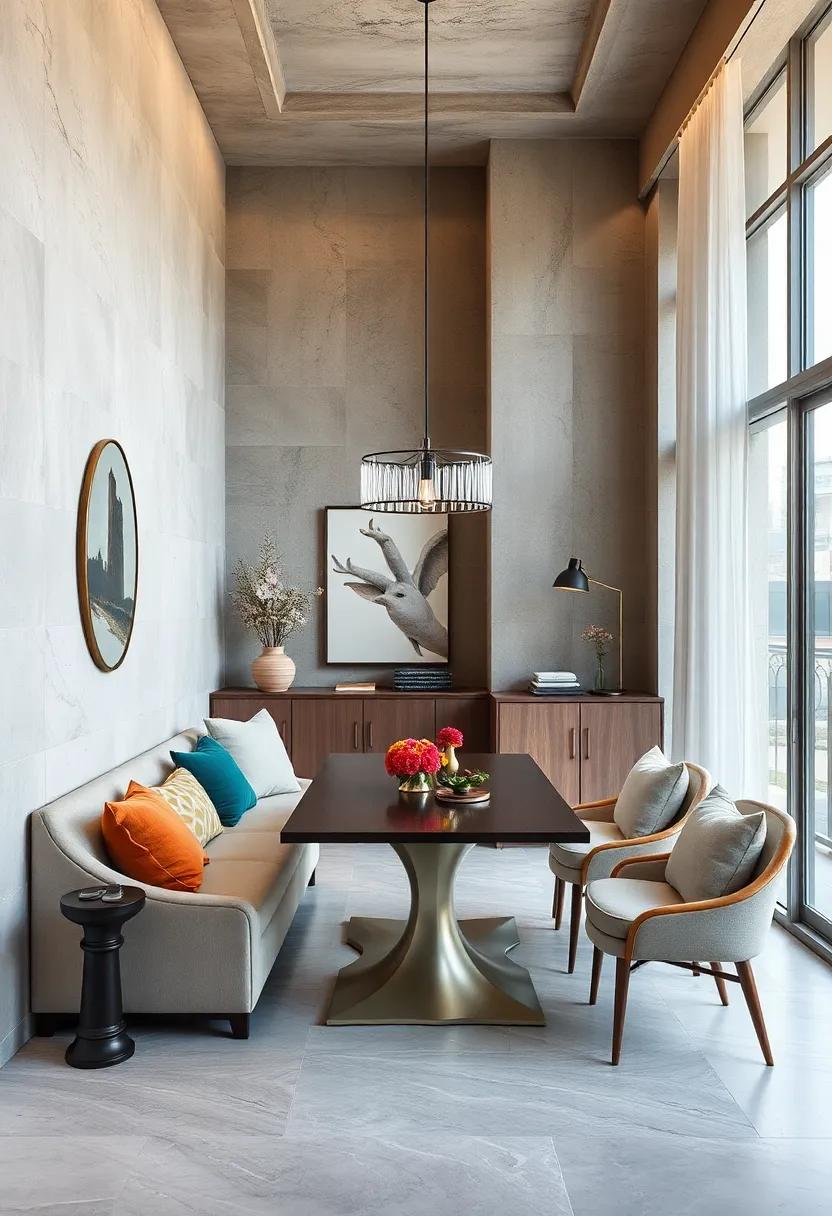
As urban living spaces shrink, the appeal of intimate dining areas continues to grow, transforming the way we experience meals. Creating a cozy nook within a small space invites a sense of warmth and connection, making mealtimes feel special and cherished. This can be achieved by reimagining underutilized corners with thoughtful design elements that prioritize both function and aesthetic. Consider using a combination of layered textures—such as soft cushions, woven throws, and unique table settings—to foster an inviting atmosphere that encourages lingering conversation over dinner.The clever use of light, through pendant fixtures or candles, can further enhance the intimate ambiance, making the dining nook a favored gathering spot in the home.
Incorporating multifunctional furniture is essential for crafting a cozy nook without overwhelming the space. Smart solutions include:
- Compact round tables that encourage conversation
- Built-in benches for additional seating and storage
- Wall-mounted shelves that can display decor and dining essentials
Each piece can contribute to a greater sense of style without sacrificing practicality, allowing for a seamless blend of aesthetics and everyday use. Ultimately, the rise of these intimate dining spaces reflects a broader trend where small homes prioritize comfort, connection, and creativity in their design choices.
Expressing Luxury: Elements That elevate Your Dining Experience
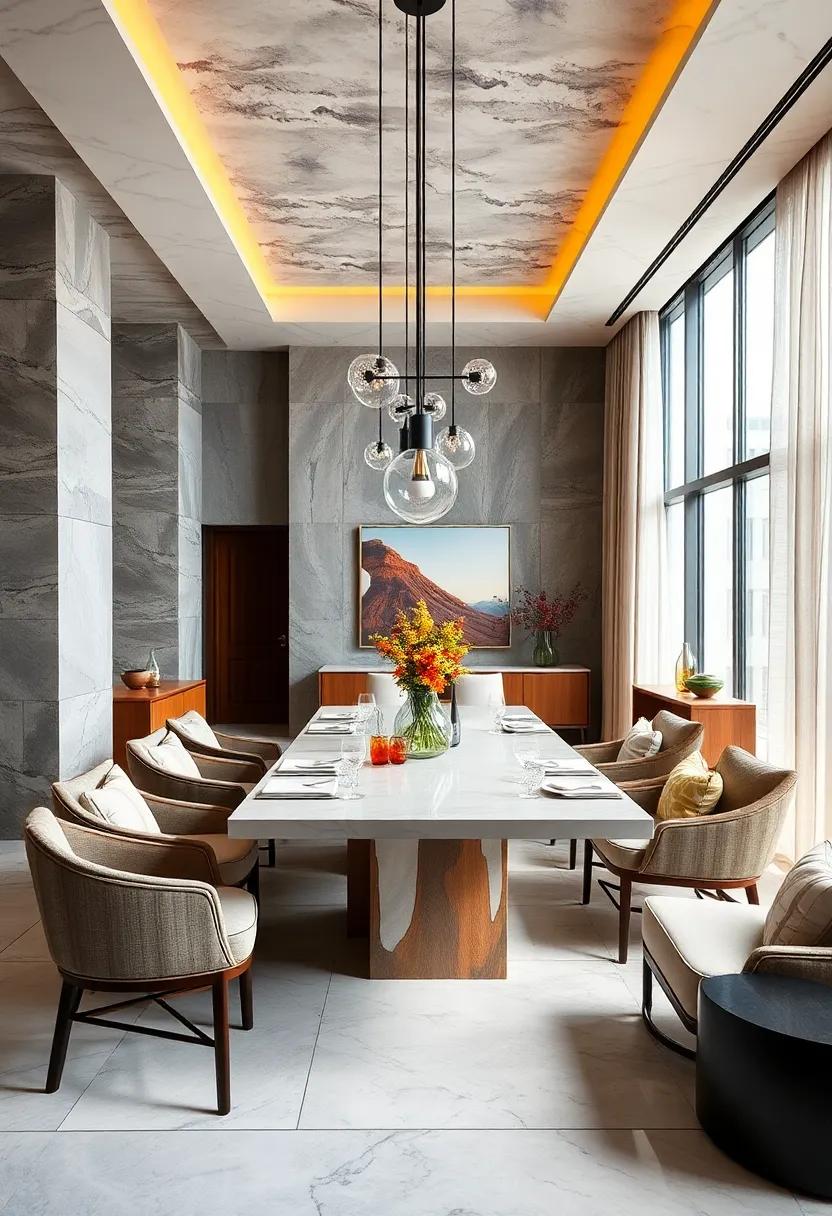
To truly achieve an atmosphere of indulgence in your dining space, consider integrating elements that appeal not just to the sense of taste but also to sight and touch. Luxurious textiles—think rich velvet or fine linen—on chair upholstery or table settings can create an inviting aesthetic. Pair these with an assortment of dinnerware that showcases craftsmanship, such as intricately designed porcelain or hand-blown glassware. The warmth of ambient lighting, perhaps from a chandelier or strategically placed candles, enhances the overall mood and makes each meal feel like an occasion.Additional touches could include:
- Artistic Centerpieces: Unique sculptures or floral arrangements that reflect personal style.
- Statement Tableware: Use of bold colors and patterns to create visual contrast.
- Layered Textures: Outdoor fabrics for multi-seasonal settings to add depth.
Incorporating technology can also elevate this opulence, such as using smart tables that allow for temperature control or built-in charging ports for devices.Beyond the furnishings, the layout of the room plays a pivotal role. A well-thought-out arrangement fosters intimacy and encourages conversation among guests. Here’s a simple table illustrating the key elements and their impact on a luxury dining experience:
| Element | Impact on Experience |
|---|---|
| Luxury Textiles | Enhances comfort and visual appeal |
| Ambient Lighting | Creates a warm and inviting atmosphere |
| High-End dinnerware | Communicates attention to detail and style |
| Smart Technology | Enhances convenience and modern appeal |
The Conclusion
the modern dining room has transcended the mere act of eating to become a multifunctional space that resonates with both practicality and style. With a myriad of design choices—from minimalist elegance to vibrant eclecticism—today’s dining spaces reflect personal tastes while accommodating the diverse needs of contemporary living. As you embark on your own journey to curate the perfect dining room, consider how the fusion of functionality and aesthetic appeal can transform not only the way you dine but also how you connect with family and friends. Whether you’re hosting a lavish gathering or enjoying a quiet meal, the essence of your dining room should encompass comfort, creativity, and a sense of belonging. embrace the trends,let your personality shine,and create a space that invites cherished moments and unforgettable memories around the table.
As an Amazon Associate I earn from qualifying purchases.

